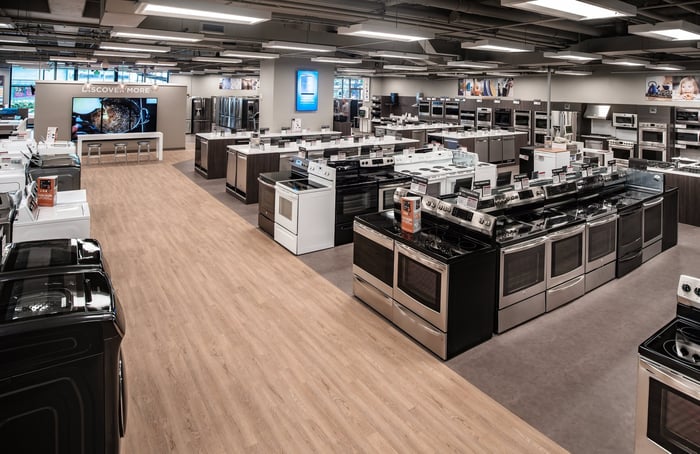Shares of Sears Holdings (SHLDQ) bounced higher on Monday after the struggling retail icon announced that a special committee of its independent directors would evaluate the potential sale of several assets. This was the second time in the span of a week that Sears stock shot higher based on a major strategic announcement. (The first was the news that the Sears Auto Center business would team up with Amazon.com to sell and install tires.)
There's a good chance that Sears Holdings will end up selling the assets it is marketing, and the total proceeds could potentially exceed $1 billion. However, that's not a reason to own the stock. While Sears Holdings still has some valuable assets, it also has substantial liabilities. Sears bulls seem to be ignoring this issue.
This sale process is no surprise
Late last month, ESL Investments -- the hedge fund controlled by Sears Holdings CEO Eddie Lampert -- made a non-binding offer to buy two pieces of the Sears Home Services business for $500 million. ESL also advised that Sears Holdings should sell its Kenmore appliance brand and expressed interest in bidding for it.
Furthermore, ESL stated that it was willing to make an offer for Sears Holdings' real estate if the board of directors wanted to sell it in bulk. However, the hedge fund stopped short of recommending a transaction of that nature.

ESL Investments may be willing to buy the rest of Sears' real estate. Image source: Sears Holdings.
Given that Lampert and ESL own about half of Sears Holdings' shares, it's not surprising that the board is going ahead with ESL's recommendations.
The special committee will explore the sale of Sears Home Improvement Products (SHIP) and Parts Direct -- the parts of Sears Holdings' home services business that ESL offered to buy -- and of Kenmore. It is working with investment bankers to try to drum up interest in these assets from potential third-party bidders. For now, the real estate is not included in the sale process. Instead, the company is likely to continue selling off properties in a piecemeal fashion.
Sears' assets are no match for its liabilities
Sears Holdings ended fiscal 2017 with current assets worth $3.8 billion. The rest of its asset value comes from the remaining payments from its Craftsman brand sale (worth about $400 million), the Kenmore and DieHard brands, the Home Services unit, its real estate, and a few other smaller contributors.
Sears has already sold off its best real estate over the past few years. What's left is probably worth $3 billion or less. ESL is willing to pay $500 million for SHIP and Parts Direct; Kenmore may be worth a similar amount. DieHard is worth far less, and the rest of Sears' home services unit probably has a negative value, due to its more than $1 billion of liabilities related to service contracts that have already been sold and paid for.

Kenmore is one of Sears' most valuable private brands. Image source: Sears Holdings.
Thus, Sears Holdings' assets together are probably worth around $8 billion. On the flip side, the company ended fiscal 2017 with more than $4.1 billion of debt -- a total that has increased in the past few months -- $1.6 billion of pension liabilities, nearly $1 billion of tax liabilities and other accounts payable, and at least $2 billion of other liabilities.
This already outstrips the value of Sears' assets. Moreover, this accounting doesn't include the potentially significant impact of future operating losses on the balance sheet.
Too little, too late
Sears Holdings bulls have long believed that Eddie Lampert would use asset sales to buy himself time while shrinking the company to profitability. Instead, Sears is still burning cash at a horrific rate: nearly $2 billion in 2017 alone.
Losses may narrow in 2018, due to the company's slimmed-down size and its cost-cutting efforts. However, Sears Holdings is far from breaking even (let alone returning to profitability), and it is finally running low on assets that can be sold. Sears Holdings stock may have surged more than 50% since late March, but it is almost certainly going to zero within the next year or two.





